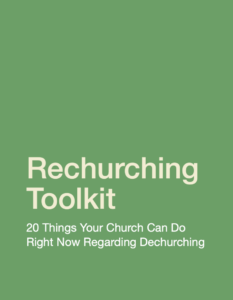One of the fascinating things about studying angelology is the stories people tell about angelic encounters.
A few years ago, I received a call from a man claiming Michael the Archangel visited him at home. The man had been plagued with demonic attacks, which subsided to some extent after his encounter with Michael. He even claimed to have video evidence of the angel. Another woman told me she encountered an angel in a shop window of a downtown department store. He didn’t say anything, she said, but the visit reminded her that God loved her.
The Christian shelves of major bookstores abound with similar tales—there’s even a series of Christian-living books about angels that have appeared in the form of dogs! Some Christian writers attempt to make spiritual powers and territorial spirits the major theme of the whole Bible. Somehow it makes the whole enterprise seem more vivid, cinematic, and exciting.
People take deep comfort from the idea that angels guard their steps and protect them from harm, or that their angel wards off the advances of the Devil. But is it wise to put our hope in such protection? And does each of us have a guardian angel?
Even raising that question runs the risk of revealing oneself as a kind of killjoy. Views on angels and demons are so frequently informed by cultural artifacts, works of fiction, and personal stories. But is there any solid biblical evidence for personal angelic protectors?
Not a New Question
This question has been asked for a long time in Christian history. The idea that each believer has an angel to guard them, and a demon to tempt them, arose in early extrabiblical writings. For example, the Shepherd of Hermas teaches that each person has two angels, one good and one evil, and gives instruction on how to tell the difference. The Epistle to Barnabas describes God’s angels as protectors of the way of light, and Satan’s angels as guardians of the way of darkness. Probably the most historically significant early writer on this issue, Origen, writes in his First Principles that “every human soul is put in subjection to some angel.”
Similar views were espoused by Basil of Caesarea and Gregory the Great and the medieval theologians and the reformers (though less so). One explanation for the pervasive belief in guardian angels is that many thoughtful Christians have espoused such a belief for a long time.
These claims in early Christian writings aren’t usually based on exegesis. The most developed versions of angelic reflections come from an attempt to account for the whole of reality in Neoplatonic terms. This influence is often overlooked, but can be seen in more well-known writers like Jerome and Augustine.
Daniel and Matthew
The exegetical argument for guardian angels boils down ultimately to a single verse:
See that you do not despise one of these little ones. For I tell you that in heaven their angels always see the face of my Father who is in heaven. (Matt. 18:10)
Because “little ones” refers to believers, as opposed to children, some take this verse to indicate that each believer has an angel in heaven assigned to them. Even if that interpretation is correct, though, the text tells us nothing about what these angels do. It certainly doesn’t confirm the speculation that they follow us around to protect us. Besides, how can they be by our side if they are viewing God’s face in heaven? (Luther says it’s because they have long arms.)
Usually, it’s taken as obvious that these angels must function similarly to angels mentioned in other passages. Daniel is a favorite for such source work. For an example, an angel protects him in the lions’ den (Dan. 6:22); another protects Shadrach, Meshach, and Abednego in the fiery furnace (Dan. 3:28).
Most notable about these protections, however, is that they are uncommon.
Matthew 18 doesn’t provide any textual link to these other passages. The reason these connections are taken as obvious has nothing to do with the texts; it has to do with how familiar people are with hearing the doctrine of guardian angels. Yet we cannot allow familiarity to override care in our interpretation and doctrine. Certainly, we shouldn’t lay so much hope on an unlikely interpretation of a single verse.
We shouldn’t lay so much hope on an unlikely interpretation of a single verse.
If they aren’t guardian angels, then who are “their angels”? We aren’t given much detail. Many commentaries note Jewish belief in the notion of guardian angels, but these ideas are relatively late (later than the writing of Matthew, in most cases). Even in these supposedly related texts, though, there is no clear doctrine about the activity of these angels.
As readers, we ought to think carefully about what is clear rather than running to speculation. In that light, it seems better to understand the reference Jesus makes in terms of the overall purpose of his teaching: that disciples matter greatly to the Father. The angelic reference is meant to accomplish this rhetorical purpose.
What About Hebrews?
Another important text to keep in mind is Hebrews 1:14, which notes that angels are “ministering spirits sent out to serve for the sake of those who are to inherit salvation.” Later speculations about how angels operate, and how they guard believers, find no basis in this verse. God’s care for his children is manifest in that the angels rejoice in salvation (Luke 15:10), carry the faithful departed to heaven (Luke 16:22), and desire to watch the gospel unfold (1 Pet. 1:12). Yet we cannot infer from these events that all believers have an angel nearby to guard them, or that each has their own personal angel.
Some Christians have taken great comfort in the idea that an angel is close by to guide or protect. The Bible doesn’t encourage us to look for such things, to seek out angels, or to attempt to commune with them. The idea that we may entertain them “unaware” (Heb. 13:2) militates against the showy, fantastic anecdotes we often hear in non-biblical accounts.
What’s the Harm?
Still, we might think, such stories bring comfort and excitement. Even if some of the people telling the stories are mistaken, what’s the harm?
The harm comes from at least two sources.
First, the doctrine provides a poor strategy for Bible reading. It takes minor characters from the biblical storyline (angels) and makes them a central focus. That approach distorts authorial intent. For example, Jesus’s almost incidental comment in Matthew 18:10 is not the point of his teaching. To build a doctrine from it is to pull the text out of proportion and occlude the point of Matthew 18 as a whole—which is about how believers ought to treat one another.
Second, it makes angels a source of comfort and solace. One feels special that an angel has been assigned to them. One feels important and significant and, what’s more, safe and protected. But it is bad doctrine that makes creatures secure by creatures. We should not look to angels to preserve us, but to God. Anything less is superstitious at best and blasphemous at worst.
For to which of the angels did God ever say, “You are my Son; today I have become your Father”? . . . To which of the angels did God every say, “Sit at my right hand until I make your enemies a footstool for your feet”? (Heb. 1:5, 13).
It is bad doctrine that makes creatures secure by creatures.
Christ breaks the “power of him who holds the power of death—that is, the devil” (Heb. 2:14). Christ is the whole armor of God against the “spiritual forces of evil in the heavenly realms” (Eph. 6:12). In him we are secure from powers and angels and rulers (Rom. 8:38–39).
Over and over again, Scripture promises the very presence of God by the Spirit through faith. We ought to take comfort in the eternal God and his everlasting arms (Deut. 33:27), not the arms of angels.
20 Things You Can Do Right Now to Prevent Dechurching
 We’re currently experiencing the largest and fastest religious shift in the history of the United States. But there are practical things we can do inside our local churches.
We’re currently experiencing the largest and fastest religious shift in the history of the United States. But there are practical things we can do inside our local churches.
Jim Davis and Michael Graham have commissioned the largest and most comprehensive study of dechurching in America. Informed by their findings, they’ve written a book and developed this corresponding toolkit with resources to help you address the dechurching phenomenon.
We’re delighted to offer you the ‘Rechurching Toolkit’ for FREE today. Click on the link below to get instant access to this resource—worth $100—and be equipped to understand and address the issues behind dechurching.





























